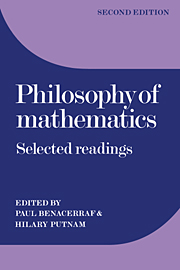Book contents
- Frontmatter
- Contents
- Preface to the second edition
- Introduction
- Part I The foundations of mathematics
- Part II The existence of mathematical objects
- Part III Mathematical truth
- The a priori
- Truth by convention
- Carnap and logical truth
- On the nature of mathematical truth
- On the nature of mathematical reasoning
- Mathematical truth
- Models and reality
- Part IV The concept of set
- Bibliography
The a priori
Published online by Cambridge University Press: 05 June 2012
- Frontmatter
- Contents
- Preface to the second edition
- Introduction
- Part I The foundations of mathematics
- Part II The existence of mathematical objects
- Part III Mathematical truth
- The a priori
- Truth by convention
- Carnap and logical truth
- On the nature of mathematical truth
- On the nature of mathematical reasoning
- Mathematical truth
- Models and reality
- Part IV The concept of set
- Bibliography
Summary
The view of philosophy which we have adopted may, I think, fairly be described as a form of empiricism. For it is characteristic of an empiricist to eschew metaphysics, on the ground that every factual proposition must refer to sense-experience. And even if the conception of philosophizing as an activity of analysis is not to be discovered in the traditional theories of empiricists, we have seen that it is implicit in their practice. At the same time, it must be made clear that, in calling ourselves empiricists, we are not avowing a belief in any of the psychological doctrines which are commonly associated with empiricism. For, even if these doctrines were valid, their validity would be independent of the validity of any philosophical thesis. It could be established only by observation, and not by the purely logical considerations upon which our empiricism rests.
Having admitted that we are empiricists, we must now deal with the objection that is commonly brought against all forms of empiricism; the objection, namely, that it is impossible on empiricist principles to account for our knowledge of necessary truths. For, as Hume conclusively showed, no general proposition whose validity is subject to the test of actual experience can ever be logically certain. No matter how often it is verified in practice, there still remains the possibility that it will be confuted on some future occasion.
- Type
- Chapter
- Information
- Philosophy of MathematicsSelected Readings, pp. 315 - 328Publisher: Cambridge University PressPrint publication year: 1984

